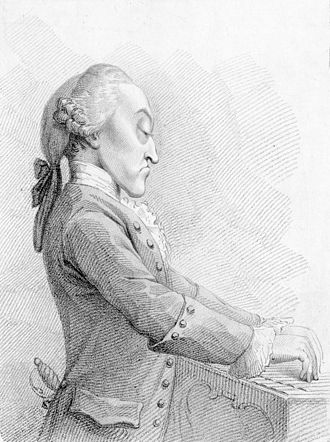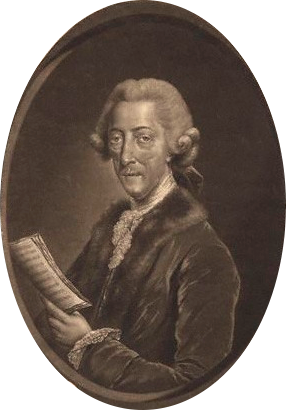Thomas Augustine Arne
"Symphony모음
1. Symphony No. 1 in C Major
2. Symphony No. 4 in C Minor 8:38
3. Symphony No. 2 in F Major 22:58
4. Symphony No. 3 in E-Flat Major 32:29
CantilenaAdrian Shepherd, Conductor
Rec.: 1985
주로 극음악과 노래를 작곡했다. 그는 코벤트가든의 킹스트리트에 있는 가구 상인의 아들로 태어난 것으로 전해진다. 이튼에서 공부한 후 법률가가 되고 싶었던 그는 몰래 바이올린과 건반악기를 연습하여 완숙의 경지에 이르렀고 그러자 아버지도 음악가가 되려는 그를 더이상 반대하지 않았다.
후일 이탈리아 오페라 관현악단의 단장이 된 마이클 페스팅에게 몇 번 레슨받은 것을 제외하고는 독학으로 공부했는데, 그의 음악적 취향의 대부분이 형성된 곳은 오페라 극장(오페라를 보기 위해 하인 복장을 착용했음)이었다. 훗날 여배우 시버 부인으로 명성을 떨쳤던 그의 누이와 남동생에게 노래를 가르쳤으며 그들을 자신의 첫 극음악인 〈로저먼드 Rosamond〉(1733)에 출연시켰다. 조지프 애디슨이 1707년에 쓴 대본을 바탕으로 한 이 오페라는 '이탈리아 방식'으로 작곡되었으며 이 작품에 나오는 화려한 에어 〈Rise, Glory, Rise〉는 그후 40년 동안 불려졌다.
그는 곧 드루어리 레인 극장을 위해 막간음악과 부수음악을 작곡했으며 밀턴의 가면극을 존 달턴이 개작한 〈코머스 Comus〉(1738)로 영국 정상의 작곡가로서의 위치를 확고하게 다졌다. 그의 가볍고 경쾌하고 즐거운 선율 양식은 가면극 〈앨프레드 Alfred, a Masque〉(〈Rule, Britannia〉로 유명함)와 〈파리의 심판 The Judgement of Paris〉에 잘 나타나 있는데 이 두 작품은 1740년 클라이브든에 있는 웨일스 공(公)의 궁에서 공연되었다. 1740~41년 〈뜻대로 하세요 As You Like It〉·〈십이야(十二夜) Twelfth Night〉·〈베니스의 상인 The Merchant of Venice〉 등 셰익스피어의 희곡에 곡을 붙인 그의 노래들은 이러한 초기 양식의 절정을 보여주고 있다.
1744년경 드루어리 레인 극장과 복스홀 가든의 작곡가로 채용되었으며 다음 10년 동안 여러 편의 노래 모음곡집을 출판했다.
1759년 옥스퍼드에서 음악박사 학위를 받았고 2년 후 그의 오라토리오 〈유디트 Judith〉가 공연되었다. 곧이어 오페라 〈아르타크세르크세스 Artaxerxes〉(1762)를 작곡했는데 이 오페라는 19세기까지도 공연되었다. 생애의 마지막 10년 동안 스트랫퍼드 셰익스피어 기념제(1769 창설)를 위한 개릭의 송시에 곡을 붙였고 〈The Fairy Prince〉(1771), 메이슨의 〈Elfrida〉(1772), 〈커랙터쿠스 Caractacus〉(1776)를 위해 음악을 작곡했다. 그의 초기 선율 양식은 자연스럽고 우아하며 어느 정도 스코틀랜드·아일랜드·이탈리아 음악의 영향이 보였다. 마지막 몇 년 동안의 작품에는 설리번을 예견하는 오페라 부파 양식이 나타나고 있지만 그의 후기 음악은 이탈리아풍이며 장식적이다. 〈Rule, Britannia〉·〈Blow, Blow Thou Winter Wind〉·〈Where the Bee Sucks〉를 비롯한 노래의 작곡가로서 퍼셀과 마찬가지로 영국의 노래 유산에 커다란 업적을 남겼다.[다음백과]
Early life
Arne was born to an Anglican father and Catholic mother in Covent Garden, and baptised at St. Paul's Church in Covent Garden.
His father and grandfather were both upholsterers and both became officials of the City Company of Upholsterers. His grandfather fell upon hard times and died in the debtors' prison of Marshalsea. Arne's father earned enough money not only to rent 31 King Street, a large house in Covent Garden,[1] but also to have Arne educated at Eton College. In later life, he too lost most of his wealth and had to supplement his income by acting as a numberer of the boxes (ticket counter) at Drury Lane Theatre.
Arne was so keen on music that he smuggled a spinet into his room and, damping the sounds with his handkerchief, would secretly practise during the night while the rest of the family slept. He also dressed up as a liveryman in order to gain access to the gallery of the Italian Opera. It was at the opera that Arne first met the musician and composer Michael Festing, who was a major influence on him. Festing not only taught him to play the violin, but also took him to various musical events, including going to compete against Thomas Roseingrave for the post of organist at Hanover Square, and a visit to Oxford in 1733 to hear George Frideric Handel's oratorio Athalia.
Upon leaving school, Arne was articled to a solicitor for three years. However, Arne's father discovered his son leading a group of musicians at what was probably one of Festing's musical gatherings. Following this disclosure of his son's real interest and talent, he was persuaded (again probably by Festing) to allow the young Arne to give up his legal career and to pursue music as a living.
Between 1733 and 1776, Arne wrote music for about 90 stage works, including plays, masques, pantomimes, and opera. Many of his dramatic scores are now lost, probably in the disastrous fire at Covent Garden in 1808.[2] Arne's sister, Susannah Maria Arne, was a famous contralto, who performed in some of his works, including his first opera, Rosamund. (With her marriage to the Drury Lane actor Theophilus Cibber she became known professionally as "Mrs Cibber".) With their brother Richard, they would often perform Arne's works together.
Arne was a Freemason[3] and active in the organisation, which has long been centred in the Covent Garden area of London, where Arne lived for many years.
Arne's Catholicism meant that he never composed music for the Church of England, unlike most other leading English composers of his time.[4]
On 15 March 1737,[5] Arne married singer Cecilia Young, whose sister, Isabella was the wife of John Frederick Lampe. During this period Arne's operas and masques became increasingly popular, and he received the patronage of Frederick, Prince of Wales, at whose country home, Cliveden, the Masque of Alfred, featuring "Rule Britannia", was debuted in 1740.
In 1741, Arne filed a complaint in Chancery pertaining to a breach of musical copyright and claimed that some of his theatrical songs had been printed and sold by Henry Roberts and John Johnson, the London booksellers and music distributors. The matter was settled out of court. Arne was certainly one of the very first composers to have appealed to the law over copyright issues.[6]
In 1750, after an argument with David Garrick, Susannah left Drury Lane for Covent Garden Theatre, and Arne followed. In 1755 during a period spent in Dublin, he separated from Cecilia, who, he alleged, was mentally ill. He began a relationship with one of his pupils, Charlotte Brent, a soprano and former child prodigy. Brent performed in several of Arne's works, including the role of Sally in his 1760 opera Thomas and Sally and Mandane in his 1762 opera Artaxerxes. Eventually Brent and Arne went their separate ways and she married a violinist named Thomas Pinto in 1766.
During the 1760s Arne frequently collaborated with the Irish writer Isaac Bickerstaffe. Thomas and Sally was the first English comic opera to be sung throughout (it contained no dialogue).[2] Artaxerxes was one of the most successful and influential English operas of the 18th century and is the only known attempt to write an Italianate, Metastasian opera seria, in the English language.[7] It was frequently performed in London into the 1830s and it was the most popular full-length English opera before the 20th century.[8][9] In a 1791 visit to London, Joseph Haydn was impressed by a performance of Artaxerxes he attended and admitted that he had no idea such an opera existed in the English language.[10]I
In 1769 Arne composed the song Soft Flowing Avon, with lyrics by Garrick, for the Shakespeare Jubilee held by Garrick in Stratford-upon-Avon to commemorate the life of William Shakespeare.
In 1777, shortly before his death, Arne and his wife were reconciled. They had one son, Michael Arne who was also a composer. Arne is buried at St Paul's, Covent Garden, London. A blue plaque, unveiled in 1988, commemorates Arne at 31 King Street in Covent Garden.[11][12
'♣ 음악 감상실 ♣ > [ 1749년 이전]' 카테고리의 다른 글
| [독일]Friedrich Hartmann Graf (0) | 2018.11.08 |
|---|---|
| [영국]John Garth (0) | 2018.02.16 |
| Late Baroque Concertos from Bohemia (0) | 2016.12.05 |
| [오스트리아]Cristiano Giuseppe Lidarti (0) | 2016.11.21 |
| 텔레만(Georg Philipp Telemann (0) | 2015.12.14 |


